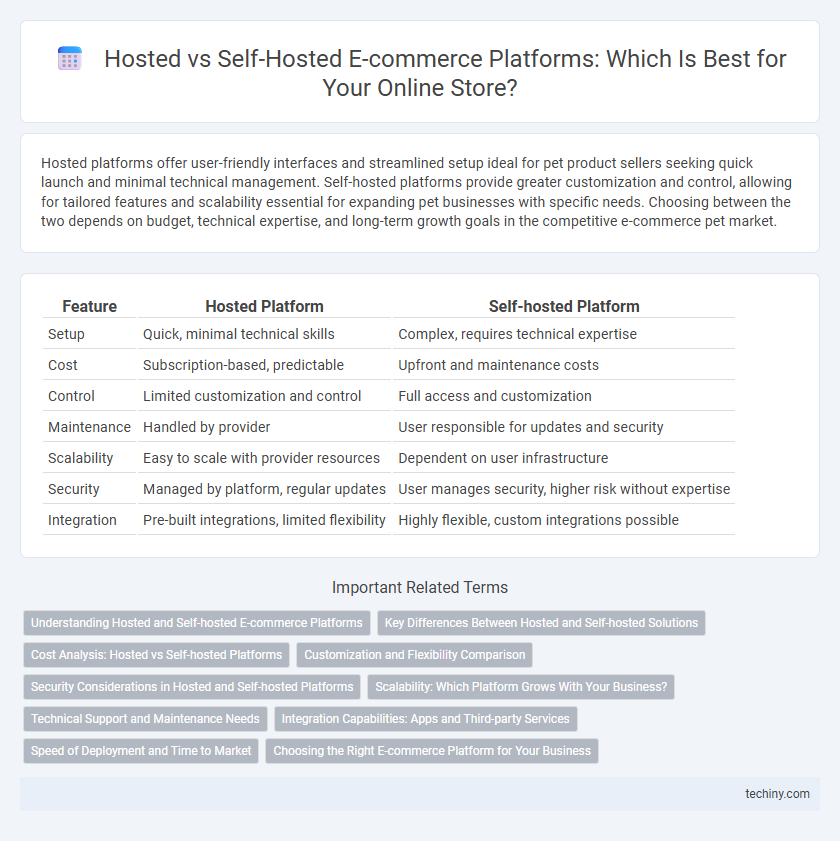Hosted platforms offer user-friendly interfaces and streamlined setup ideal for pet product sellers seeking quick launch and minimal technical management. Self-hosted platforms provide greater customization and control, allowing for tailored features and scalability essential for expanding pet businesses with specific needs. Choosing between the two depends on budget, technical expertise, and long-term growth goals in the competitive e-commerce pet market.
Table of Comparison
| Feature | Hosted Platform | Self-hosted Platform |
|---|---|---|
| Setup | Quick, minimal technical skills | Complex, requires technical expertise |
| Cost | Subscription-based, predictable | Upfront and maintenance costs |
| Control | Limited customization and control | Full access and customization |
| Maintenance | Handled by provider | User responsible for updates and security |
| Scalability | Easy to scale with provider resources | Dependent on user infrastructure |
| Security | Managed by platform, regular updates | User manages security, higher risk without expertise |
| Integration | Pre-built integrations, limited flexibility | Highly flexible, custom integrations possible |
Understanding Hosted and Self-hosted E-commerce Platforms
Hosted e-commerce platforms provide an all-in-one solution with integrated hosting, security, and maintenance managed by the service provider, ideal for businesses seeking ease of use and scalability without technical overhead. Self-hosted e-commerce platforms require users to manage their own web hosting, security, software updates, and server maintenance, offering greater customization and control suitable for businesses with technical resources and specific requirements. Understanding the trade-offs between hosted and self-hosted options helps businesses choose a platform aligned with their budget, technical expertise, and growth strategy.
Key Differences Between Hosted and Self-hosted Solutions
Hosted platforms offer managed services with built-in security, scalability, and technical support, reducing the need for in-house IT resources. Self-hosted platforms provide greater customization, full control over data, and flexibility to choose infrastructure, but require technical expertise and responsibility for maintenance. Cost structures differ, with hosted solutions typically involving subscription fees and self-hosted platforms incurring upfront setup and ongoing operational expenses.
Cost Analysis: Hosted vs Self-hosted Platforms
Hosted platforms typically incur recurring monthly or annual fees covering hosting, security, and maintenance, making them cost-effective for businesses seeking predictable expenses. Self-hosted platforms require significant upfront investment for server infrastructure, software licenses, and ongoing IT management, often resulting in higher long-term costs. Evaluating total cost of ownership, including scalability and customization expenses, is crucial for informed decision-making between hosted and self-hosted e-commerce solutions.
Customization and Flexibility Comparison
Hosted platforms offer limited customization options due to predefined templates and restricted access to backend code, making them ideal for users seeking simplicity over extensive flexibility. Self-hosted platforms provide full control over the design and functionality, enabling businesses to tailor every aspect of their e-commerce site to specific branding and operational needs. However, the increased customization potential in self-hosted solutions requires technical expertise and ongoing maintenance compared to the more user-friendly setup of hosted platforms.
Security Considerations in Hosted and Self-hosted Platforms
Hosted e-commerce platforms offer built-in security features such as SSL certificates, PCI compliance, and regular security updates managed by the service provider, reducing the risk of data breaches. In contrast, self-hosted platforms require merchants to implement their own security protocols, including firewalls, encryption, and vulnerability patching, demanding significant technical expertise to maintain robust protection. Choosing between the two hinges on balancing convenience and control against the need for tailored security measures and responsibility for ongoing cybersecurity management.
Scalability: Which Platform Grows With Your Business?
Hosted platforms offer seamless scalability with built-in infrastructure that automatically adjusts to increased traffic and sales volume, ideal for rapidly growing e-commerce businesses. Self-hosted platforms require manual server upgrades and resource management, providing greater control but demanding technical expertise and investment to scale effectively. Choosing the right platform depends on balancing growth flexibility against customization and operational control.
Technical Support and Maintenance Needs
Hosted e-commerce platforms provide built-in technical support and regular maintenance handled by the service provider, reducing the need for in-house IT resources. Self-hosted platforms require dedicated technical expertise to manage security updates, server maintenance, and troubleshooting, increasing operational overhead. Choosing hosted solutions minimizes downtime risks and ensures automatic software upgrades, critical for maintaining seamless online store performance.
Integration Capabilities: Apps and Third-party Services
Hosted e-commerce platforms offer seamless integration with a wide range of apps and third-party services through built-in marketplaces, simplifying setup and maintenance for merchants. Self-hosted platforms provide greater flexibility for custom integrations and direct API access, enabling tailored solutions but requiring advanced technical expertise. Choosing between the two depends on the business's need for customization versus ease of connectivity with popular tools like payment gateways, marketing automation, and inventory management systems.
Speed of Deployment and Time to Market
Hosted e-commerce platforms significantly reduce speed of deployment by providing pre-built infrastructure and integrated tools, enabling businesses to launch online stores within days or weeks. Self-hosted platforms require extensive setup, customization, and server management, leading to longer time to market that can stretch from several weeks to months. Rapid deployment on hosted platforms accelerates market entry and supports agile marketing strategies, crucial for capturing timely sales opportunities.
Choosing the Right E-commerce Platform for Your Business
Choosing the right e-commerce platform depends on your business's technical capabilities and growth goals; hosted platforms offer ease of use, built-in security, and maintenance handled by providers like Shopify or BigCommerce, ideal for startups or small businesses. Self-hosted platforms such as WooCommerce or Magento deliver full control, customization, and scalability but require more technical expertise and dedicated hosting management. Evaluating factors like budget, customization needs, security requirements, and scalability will help determine whether a hosted or self-hosted solution best aligns with your e-commerce strategy.
Hosted Platform vs Self-hosted Platform Infographic

 techiny.com
techiny.com